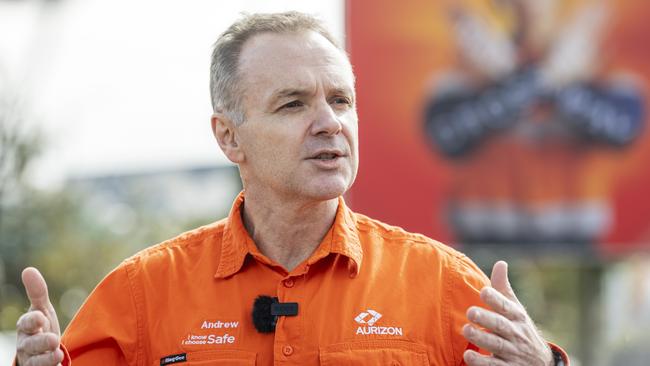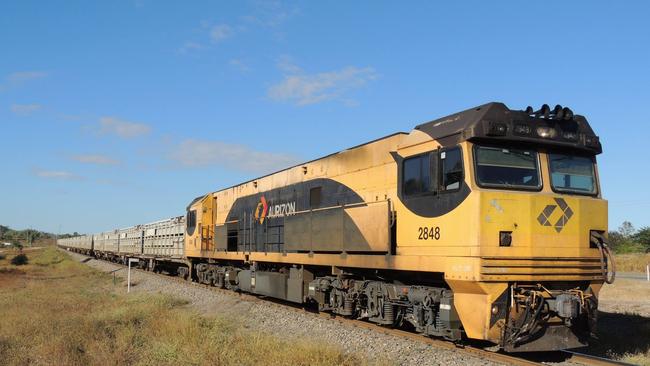Aurizon warns of financial impact of Whyalla steelworks troubles
Aurizon has resumed rail services for the Whyalla steelworks, but warns uncertainty over the facility’s future could dent the company’s full-year results.

Rail freight operator Aurizon has resumed services for the troubled Whyalla steelworks in South Australia, but the company has warned that uncertainty surrounding the future of the facility could dent its annual results.
Aurizon transports iron ore from GFG Alliance’s mining operations in the Middleback Ranges to the steelworks and to Whyalla’s port for export, but suspended operations in October as it chased unpaid bills.
After reporting its half-year results on Monday, the company’s managing director Andrew Harding confirmed that services had resumed, but declined to comment on how much the company was owed and whether a payment agreement had been reached with GFG.
But the company’s accounts reveal a $11m provision for doubtful debts has been raised in the company’s bulk division, relating to what chief financial officer George Lippiatt described as late payments from a “small number” of customers.

He declined to comment on who the customers were, but told analysts there was a risk that the provision could be increased in the second half.
“Railings for one of these customers were suspended during the half, and I note that while we are currently railing for each of them, there is a risk that they cease operations or don’t continue under the current contractual arrangements,” he said.
“This could represent a further downside for the bulk business in the second half.
“If those customers don’t meet their payment plans, or we cease railing for them, then there’s a risk that provision increases.”
Aurizon also reported a hefty increase in late payments, with $107m worth of receivables past their due date at the end of December, up from just $41m in June.
“That is larger than we’d expect, but it’s consistent with the increase in that provision for doubtful debts,” Mr Lippiatt told analysts.
Aurizon’s bulk and containerised freight business, which transports commodities including iron ore and grain across the country, weighed on the company’s half-year results.
EBITDA across the group was 4 per cent lower at $814m, driven by a 25 per cent fall in earnings in the company’s bulk division to $84m.
Earnings across the company’s two coal-related units were broadly in line with expectations, while statutory profit for the group came in at $233m, down 2 per cent, on a 3 per cent increase in revenue to $2.02bn.
Aurizon also announced on Monday that it was reviewing the current ownership structure for its network division, which manages 2670km of rail lines servicing Queensland’s coking coal basin.
Aurizon, which runs a haulage business that transports coal and other commodities, as well as a separate division that operates rail networks, has previously considered a formal separation of the two businesses.
Mr Harding did not say what options were being considered as part of the review, but said the company’s rail networks business had received significant interest from external investors over the years.
“The truth is, we have had many banking groups come through with pitches over the years … I’ve seen that probably for the last six or seven years.”
Aurizon said on Monday that it was making good progress on its ambitious landbridge scheme designed to speed up the movement of goods from Asia into Darwin and down to the southern states via the Tarcoola to Darwin rail line.
The company announced a new service on Monday in partnership with global shipping company ANL, which the company says delivers customers up to 10 days in time savings.
Aurizon extended its on-market buy-back by another $50m on Monday, bringing it to a total of $300m, while the company declared an interim dividend of 9.2 cents per share, franked at 60 per cent. That was down from 9.7 cents in the previous corresponding period.
The company maintained its guidance metrics for the full year, but said each was likely to come in at the lower end of their given ranges.
Group underlying EBITDA is forecast to come in at $1.66bn-$1.74bn, while sustaining capex guidance has been maintained at $640m-$720m and growth capex at $125m-$175m.
The company’s shares were trading 0.5 per cent lower on Monday afternoon at $3.18.





To join the conversation, please log in. Don't have an account? Register
Join the conversation, you are commenting as Logout